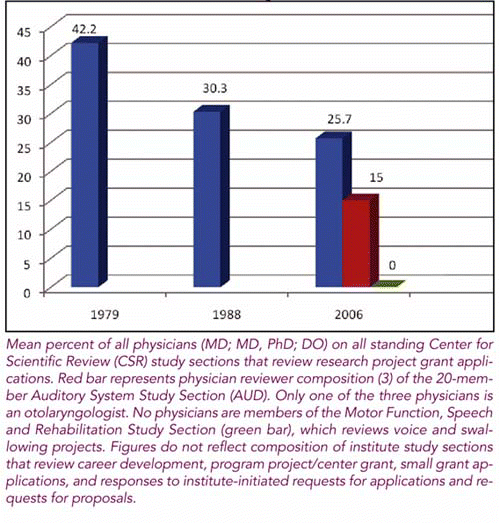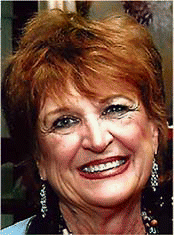Some seasoned investigators have found, however, that competition for funding is tougher than ever before: More applications of significantly higher quality are being submitted, and the average grant budget is more than 60% higher today than it was 10 years ago (IMPAC database, www.NIH.gov ); so even though the NIH’s budget doubled between 1998 and 2003, its buying power did not increase proportionately. Since 2003, the NIH budget appropriation has plateaued at essentially the same level, while research costs continue to rise. Moreover, with representation of physician reviewers on study sections at its lowest point in almost 30 years, otolaryngologists are often not at the table to serve as advocates for their peers’ medically oriented research projects (Figure 3). Other investigators are choosing to relinquish their grants without attempting to renew them in the face of escalating demands for clinical productivity in their academic departments, or the desire to carve out a more balanced lifestyle with family, friends, and free time.
Explore This Issue
September 2007The longevity record among the currently active research project grants belongs to Triological Society member Joseph B. Nadol Jr., MD, of the Massachusetts Eye and Ear Infirmary, for his project, Electron Microscopy of the Human Inner Ear, now in its 26th year of funding. His record is closely matched by Bruce Gantz, MD‘s cochlear implant program project grant (21 years), Richard Chole, MD, PhD‘s cholesteatoma project (19 years), and Dr. Richard T. Miyamoto, MD‘s two cochlear implant projects (16 and 18 years, respectively). An important national resource, the Yerkes National Primate Research Center, is supported by a specialized center grant now in its 46th year and is led by Michael M.E. Johns, MD, who was recently named Chancellor of Emory University.
Among the most durable of the grants are the institutional training grants (T32), the mainstay of research training for residents. Of the 13 institutional training grants led by otolaryngologists, 9 (69%) have been funded for 10 years or longer: University of Washington (24 years); University of Pittsburgh (21 years, 12 years); Washington University (20 years); Johns Hopkins University and Massachusetts Eye & Ear Infirmary (18 years each); University of Iowa and Memorial Sloan-Kettering (14 years each); and M. D. Anderson Cancer Center (10 years).
©2007 The Triological Society


Leave a Reply